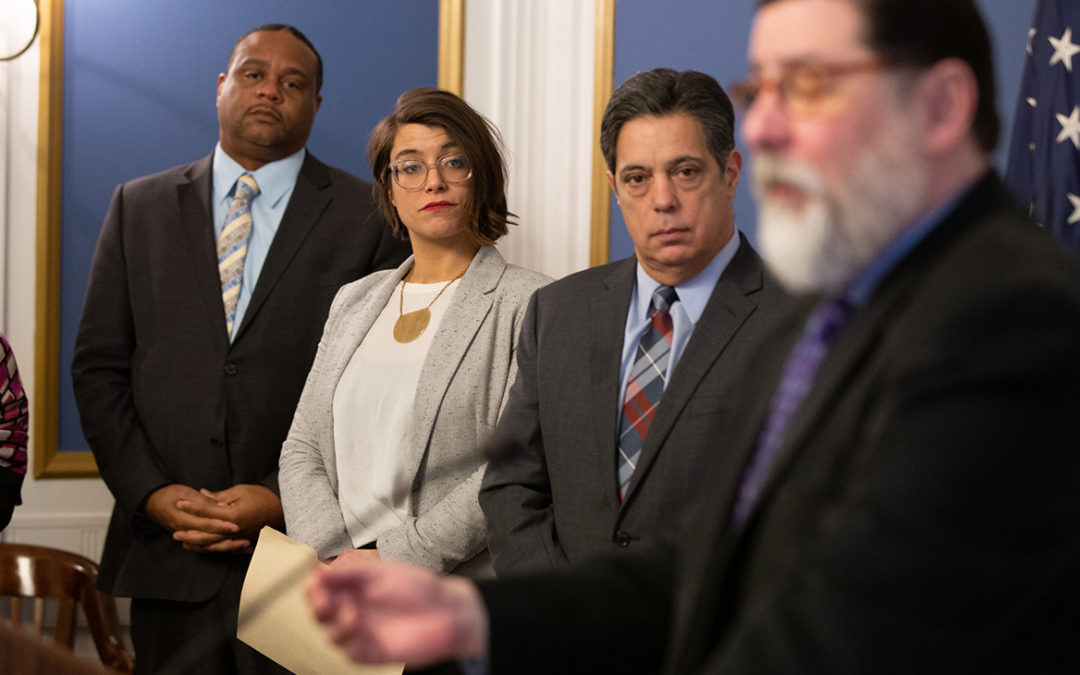Pittsburgh, Pa. − January 22, 2019 − At a press event today in Pittsburgh Mayor William Peduto’s office, Senate Democratic Leader Jay Costa, Jr., Representatives Ed Gainey and Sara Innamorato, and the Mayor announced plans for a property tax relief program for Pittsburgh.
As Pittsburgh continues to experience increased investment and development pressure in specific neighborhoods of the city, longtime owner occupants have been and will continue to be put at risk of being forced out of their homes due to rapid increases in property taxes. Given these rising costs, the City of Pittsburgh sought options to keep homeowners in place.
The current state law requires for Allegheny County to enact an ordinance that would then allow the other municipalities within the county to enact their own programs to defer or exempt increasing taxes. However, Allegheny County has been unable to create a program that defined the parameters of the program specifically enough to satisfy court challenges or flexible enough to meet the varying needs of is many local governments.
Senator Costa is currently seeking cosponsors on a bill that would allow Allegheny County to create a longtime owner occupant program (LOOP).
“Rising living costs and constantly increasing tax burdens are pushing longtime residents out of the homes they have worked their entire lives to own and age in,” said Senator Costa. “It’s important that we provide relief from these increases to help stabilize property tax bills, home ownership, and communities.”
Proposed changes would involve:
- Amending the title of the statute from “First and Second Class County Property Tax Relief Act” to “First and Second Class County and City Property Tax Relief Act”;
- Amending occurrences of “counties of the first and second class” to read “counties and cities of the first and second class”;
- Further discussion on whether any amendments to Section 4749.4(c) would be necessary; and
- Amending Section 4749.5(c)(2) from “School districts and municipalities within a county of the second class may…” to read “School districts and municipalities within a county of the second class, including cities of the second class, may…”
“We want our neighborhoods to be better, but we don’t want to price people out,” said Rep. Ed Gainey, D-Allegheny. “We need to make sure that as Pittsburgh rises, the people who have lived in our communities are not left behind, or removed to make way for new development. We have an affordable housing crisis in this city, and it is our moral responsibility to invest in and defend those longtime residents who have built lives in their neighborhoods.”
“As Pittsburgh continues to grow economically, we need to invest in our communities in a way that is sustainable and equitable,” said Rep. Sara Innamorato, D-Allegheny. “New development and investment should never be at the expense of residents who were here during the hard times, who have invested their lives in their neighborhoods. As our city advances we need to make sure that the fabric of our neighborhoods is not torn apart, and that everyone gets to benefit from growth in their neighborhood.”
There are distinct differences between the application of the statute in a county of the first class with one municipality and a county of the second class with 130 municipalities. Most notably, there are practical challenges in the ability to properly define the eligibility parameters and designated geographic areas for counties of the second class given the large number of municipalities.
“We need to make sure those who stayed in Pittsburgh through the bad times can remain in their homes through the good times. This legislation will help us ensure that,” Mayor William Peduto said.
###

